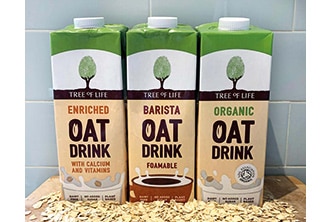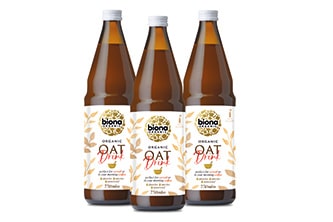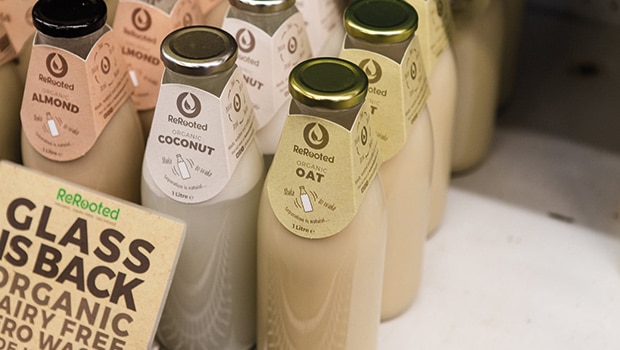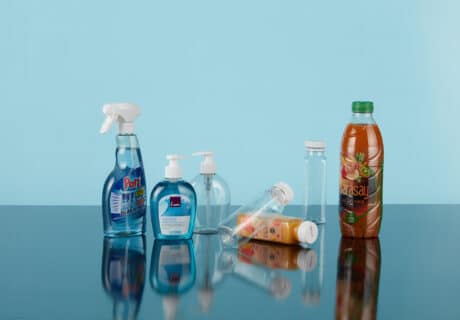Jane Wolfe discovers the latest developments in the thriving and highly competitive plant-based milk market
Who’d have thought plant-based milk could be so controversial? In the past year we’ve seen court action between brands, legislation come and go regarding the use of dairy-based descriptors and concerns raised about sustainability.
But the sector is flourishing and continuing to expand – for confirmation look no further than the big players who are eager to get a piece of the plant-based pie, most recent examples of which include Britvic’s acquisition of Plenish, the appearance of the Nestlé Wunda brand, and Linda McCartney Foods’ first-time entry into the category.
Maria Mascaraque, industry manager at Euromonitor International, says the space has definitely benefited from heavy investments, “And this is likely to speed up more acutely with the entry of big consumer companies, such as Nestlé and Danone, who are investing in start-ups that are ahead of the game.”
The global dairy alternatives market was valued at $20.50 billion (£14.8 billion) in 2020, according to Grand Review Research, and is expected to grow at a CAGR of 12.5% from 2021 to 2028. The firm states that demand is growing due to a shift in consumer eating patterns and diet trends, and increasing instances of milk allergies and lactose intolerance which are expected to further drive demand.
Dairy vs. plant
Although an October 2020 vote by the European Commission to further restrict the use of dairy-related terminology for plant-based products was overturned this year, they still can’t sport the descriptor ‘milk’. Common get-arounds include m*lk, mylk, m’lk or simply drink or shake but, whatever you want to call them, how do they stack up when it comes to nutrition?
“Contrary to popular belief that you need to drink cow’s milk for calcium, fortified plant milks actually contain the same amount of calcium, and soya, coconut and almond varieties are considerably lower in fat than whole cow’s milk,” says Andrea Rymer, dietitian at The Vegan Society. “The quantity and quality of protein in soya and pea milk is similar to cow’s milk, and this sets it apart from other varieties. Therefore, these are great choices for under-fives, athletes, adults over 65, and anyone else who may need more protein in their diet.”
Contrary to popular belief
that you need to drink cow’s
milk for calcium, fortified
plant milks actually contain
the same amount of calcium
Rymer adds that fortified whole oat milk has a similar fat content to whole cow’s milk, but is much lower in saturated fat. However, she says rice milk, ‘which seems to be a less favourable option according to market research’, isn’t suitable for children under five due to traces of arsenic.
“It’s important for brands to offer a fortified option in their range so consumers are able to easily make the switch from dairy milk to dairy-free drinks without having to ensure they are getting enough calcium in other parts of their diet, as nutritionally alternative milks aren’t the same as dairy milk,” says Rude Health co-founder Camilla Barnard. “We’ve fortified our range with a natural source of calcium, by blending a small amount of seaweed … Just enough to offer a range of drinks that are high in calcium, without affecting
the taste.”
Barnard says dairy-free drinks continue to be the brand’s best performing category, currently growing at 20% YOY, with Almond Drink being the best-seller of its 21 SKUs. “The dairy-free drinks category continues to be in double-digit growth and has seen significant growth as a result of COVID-19, as many consumers took a big interest in their personal health and the health of the planet,” she adds.
Strife in the sector
But this rise in interest has led to some trouble in alt-milk paradise. In August – in what was characterized as a ‘David and Goliath battle’ – British oat milk producer Glebe Farm came out on top in a court case brought by Oatly alleging trademark infringement.
Oatly claimed the name and packaging for Glebe Farm’s PureOaty oat milk was too similar to its own and accused the brand of ‘passing off’ its products as Oatly’s. All of the Swedish giant’s claims were dismissed, but the legal action does highlight the increased competition bigger companies are facing from challenger brands in this sector.
“Oatly has claimed that this legal action is just standard business practice,” commented Glebe Farm owner and MD Phillip Rayner at the time: “However, it was very clear to us that this was not the case. We decided it was time to stand up to this behaviour, and that in our view ‘corporate might does not make right’. It is enormously gratifying that the judge has ruled in our favour, and to see that smaller independent companies can fight back and win.”
He added: “There is room in a growing category for alternatives. We’d like to think growth opportunities come from positivity in broadening sector choice, rather than from trying to shut things down and limiting consumer options.”
The sector is becoming crowded though, with new brands regularly coming to market. So what does Barnard believe companies need to do to survive and thrive? “At Rude Health we always say that we stand out in a sea of sameness, both physically with our bold, bright packaging, but also when it comes to our brand positioning and mission which is to make the healthy choice a celebration, not a sacrifice. We talk about the bright way to be healthy, not the wrong or right way … we lead with mouths and taste – which is actually the number one reason people stay within the dairy-alternative category.”
Eco credentials
With data suggesting some dairy alternative ingredients, such as rice and almonds, are water-intensive to grow, the need for sustainability on all levels within the sector is something brands are increasingly taking on board.
Rude Health became a B Corp company in June 2021, which has helped it highlight the sustainability credentials which have ‘been engrained in our brand DNA from the beginning’, says Barnard. “We’re a proud B Corp brand, which means we’ve made a commitment to constantly improve our people policies and sustainability credentials,” she says.
The brand recently switched to sourcing British oats, enabling it to save 55,000 air miles annually – ‘that’s twice around the earth’. Its drinks packaging is 100% recyclable and the packs are made from 88% renewable materials (the goal is to make that 100% by 2022).
This year Glebe Farm commissioned NFU Energy to produce the Oat Milk Carbon Accounting Report examining the carbon dioxide footprint of its oat drink from initial cultivation to point of distribution. The study found that 0.29kg of CO2 equivalent is emitted on average per litre of PureOaty oat drink produced, lower than any other oat drink currently reporting comparable figures in the UK.
Commenting on the report, Rayner says: “As food growers and manufacturers, we recognize our responsibility to minimize the environmental impact of our operations, and this report highlights the unique benefits our British farm can offer to the growing UK plant-based drinks market.”
As food growers and manufacturers, we recognize our responsibility to minimize the environmental impact of our operations
Totnes-based ReRooted also has sustainability at its heart. Starting out two years ago making plant milks for its local zero waste shop Earth.Food.Love, it now delivers organic, zero-waste plant milks in returnable, refillable glass bottles, to households, cafés and shops across Devon, Cornwall, Bristol and Bath, as well as nationwide with help from Riverford Organic. A member of 1% for the Planet, its doorstep deliveries are done with electric vehicles, wherever possible it sources locally, and it powers the entire business – from bottle-washing to vans – with renewable energy.
Moving away from liquid formats, Nooj is a ‘pure, smooth and creamy’ nut paste available in Almond or Cashew. The product blends 60% nuts with spring water and a touch of sea salt which, when water is added, turns into a ‘luxurious’ nut milk – either full-cream, semi, or skimmed – depending on the dilution. The brand says that while many plant milk brands filter out much of the nut and discard it, Nooj contains the whole nut, thus providing more nutrients and fibre. Packaged in a convenient 150g pouch, it can be easily stored in the fridge and is condensed so there’s less overall packaging.
And further afield, Berlin-founded Blue Farm’s Oat Base powder (available in organic and non-organic) produces up to eight litres of gluten-free oat drink – so one bag saves up to eight milk cartons – and is made from 100% oats that are regionally and sustainably produced. Its current packaging consists of 100% monoplastic, is produced in a climate-neutral way and is 100% recyclable.
Stars of the show
Ingredient options for plant-based milks are expanding, with soya being the first to achieve wide recognition, but fading into the background somewhat with the emergence of pea, almond, oat, hemp seed, coconut, flaxseed, rice, spelt, brown rice, tiger nut, hazelnut, cashew, barley … you name it.
Research by Euromonitor has found that ‘non-soya milk alternatives’ is the fastest growing category, rising 16% in 2020-2021. It notes that soya drinks are less in demand due to poor consumer perception of the ingredient, whereas other non-dairy milks have driven innovation, growing the UK market by 69%, with non-soya-based milks increasing by 130% over the past five years.
Further down the line, new ingredients in that space are expected to spur, including water lentils or even algae
“In the next couple of years, the focus is likely to remain on exploring further ingredients such as peas, chickpeas, and fava beans, due to their high protein level, and companies increasingly relying on blends to make them tastier, for example combining peas with oats or coconut,” says Mascaraque. “Further down the line, new ingredients in that space are expected to spur, including water lentils or even algae.”
Barnard notes she has witnessed multiple brands launch pea and chickpea drinks into their ranges. “In fact, we’ve just launched a Pea & Oat Drink into ours,” she explains. “It’s high in protein and so serves a different audience to our core range.” Another recent Rude Health innovation is Roasted Almond & Oat Drink, which is a blend of two of the brand’s best-sellers.
Tasty combos
Another brand not sticking to the single-ingredient model is start-up Lilk which launched with: The Common Blend, an everyday go-to combining oat and rice; and The Lush Blend, with oat, coconut and quinoa for a creamier option. Co-founders Bastien and Elisa Eymery created the brand when they couldn’t find a plant milk that tasted good in both tea and coffee and when consumed on its own. “We began taking the ingredients of our favourite plant milks and experimenting with blending,” says Bastien. “It was amazing to discover how ingredients that are not usually put together worked so well to give us the elements that we craved.”
Rebel Kitchen’s latest launch is its Barista Mylk which combines organic oats, coconut cream, faba bean protein, sunflower seed extract and nutritional yeast. Made specifically for coffee, it was created alongside world-renowned coffee expert James Hoffmann and the brand claims it’s the only plant-based alternative that tastes and works like dairy milk, offering the perfect choice for lasting latte art with a silky texture and tight microfoam.
The point of difference with Nutty Bruce’s range of unsweetened nut M*lks is that the nuts used are activated. Each of the three variants – Almond, Almond & Coconut, Almond & Oat – contains a high content of activated almonds, with Almond boasting 5%. The company says that activation produces nuts with higher nutritional bioavailability which are gentle on the gut. To activate its almonds, the brand soaks them for 12 hours in fresh filtered water to kick-start the germination process before carefully drying them.
Image credit: Rerooted
 Deliciously Dairy-free, Great Value Oat Drinks
Deliciously Dairy-free, Great Value Oat Drinks
Tree of Life UK Ltd
Tel: 01782 567100
E-mail: [email protected]
www.treeoflife.co.uk
Ideal for a plant-based lifestyle, Tree of Life Oat Drinks are smooth, creamy, dairy-free and packed with the goodness of wholegrain oats, with no added sugar. Our drinks contain a higher than average percentage of oats, whilst our natural extraction process ensures the beneficial soluble fibres (beta-glucans) are retained. Available in 3 delicious varieties: our Barista Drink is perfectly crafted for coffee creations; our Enriched Drink contains extra good stuff with added calcium & vitamins D, B2 & B12, and our Organic Drink is certified by the Soil Association for our health and that of the planet.
 Biona Organic Oat Drink
Biona Organic Oat Drink
Biona Organic
Tel: 0208 547 2775
E-mail: [email protected]
www.biona.co.uk
Addressing the demand for more sustainable, plastic-free options for your everyday grocery essentials, Biona Organic Oat Drink comes in a fully recyclable glass bottle. This vegan milk alternative is made with just 4 ingredients: water, gluten free wholegrain oats, sunflower oil and a pinch of sea salt. The perfect plant-based milk alternative for your tea, coffee, breakfast or in sauces.





